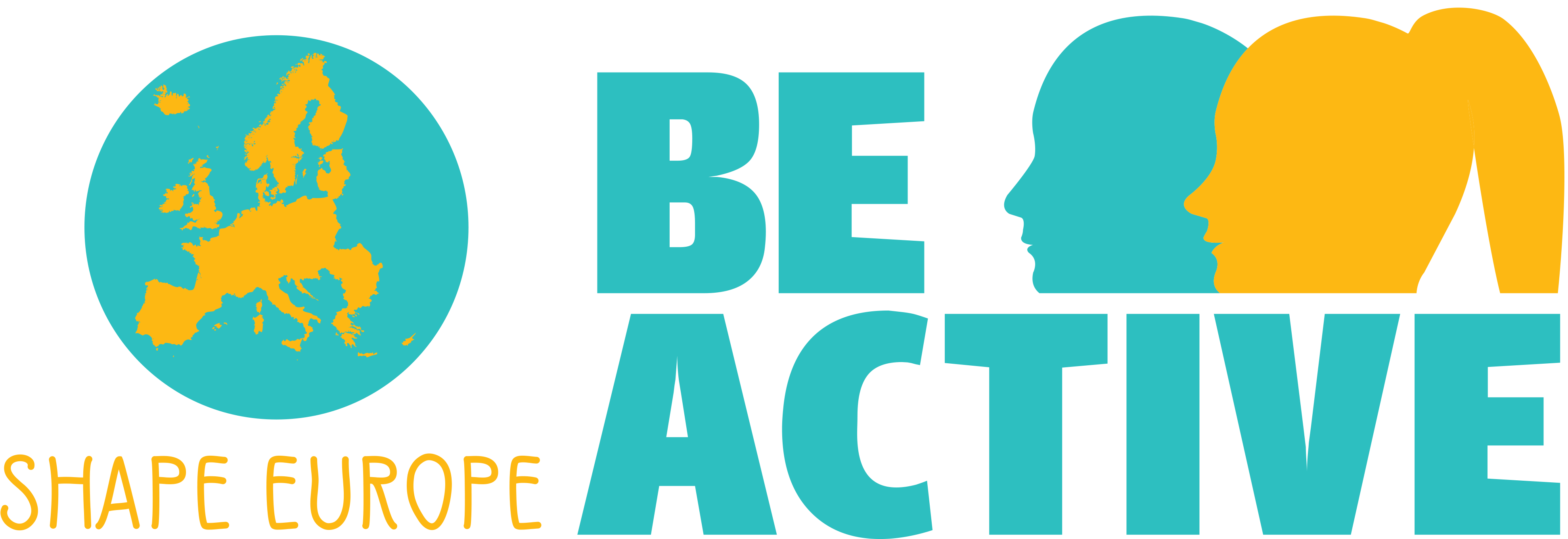
by beactive | May 15, 2021 | News
A finalidade do projeto é aproximar diferentes municípios da Europa e oferecer uma plataforma para o intercâmbio de ideias e práticas inovadoras na área do trabalho com jovens.
Objetivos principais
– Realçar o interesse dos jovens Europeus na vida política e cívica
– Promover a cidadania ativa e a participação nos procedimentos políticos, tais como as eleições europeias de 2019
O projeto “BASE” é desenvolvido por 6 municípios de diferentes países (Grécia, Inglaterra, Eslovénia, Itália, Portugal e Bulgária) que reconhecem a importância do trabalho em conjunto no domínio do envolvimento jovem e cidadania Europeia ativa. A longo prazo o objetivo do projeto é sensibilizar os jovens, reforçar o seu interesse na vida politica e cívica, para que de futuro, se envolvam mais nos processos políticos, tais como as eleições de 2019.
Jovens e decisores políticos de 6 países diferentes irão encontrar-se e discutir temas tais como os valores da democracia, multiculturalismos e coesão social. A interação entre os jovens e o intercâmbio de boas práticas resultarão no incremento da cidadania ativa, assim como reconsideração das suas perceções relativamente aos valores europeus e reflexão acerca do seu futuro envolvimento na sociedade e vida política.
O resultado esperado do projeto é a motivação dos jovens e a sua participação na vida politica respeitando identidades diversas, diferenças culturais e vários aspetos políticos, especialmente nas Eleições Europeias de 2019.
Jovens, sociedade civil, autoridades locais, decisores políticos e agentes da UE irão participar nos workshops e discussões sobre o futuro da UE, contribuindo para um papel a desenvolver, que inclui propostas para o apoio ao envolvimento democrático, democracia direta e envolvimento jovem.
Calendarização do projeto
- Kick-Off Evento – Thessaloniki – Grécia;
- Diálogo Estruturado – Santa Maria da Feira – 11/07/2019;
- Workshop Nacional – Santa Maria da Feira – 26 Novembro 2019;
- Simulação Transnacional do Parlamento Europeu – Grécia Thessaloniki– 13 e 14/04/2021;
- Workshop Transnacional – GréciaThessaloniki – 11 e 15/04/2021.
[+]INFO: http://beactive-shapeeurope.eu/
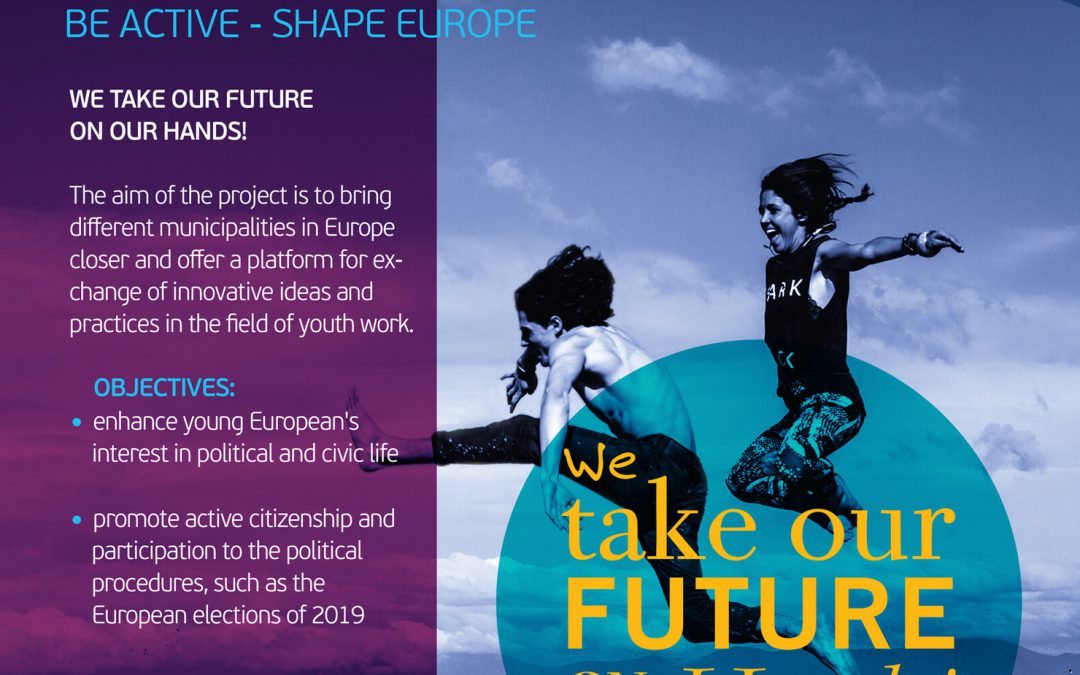
by beactive | Apr 24, 2021 | Events, News, Workshops
Funded by the Europe Union through the Europe for Citizens Fund the Young Mayor Team are part of a project called Be Active Shape Europe. It is a partnership led by an organisation called Kedith in Thessalonikki in Greece. The other partners are Santa Maria da Feira in Portugal who we do lots of work with, Association” Varna – European Youth Capital” in Bulgaria, Mladinski Cultural Center, Maribor in Slovenia and Comune di Cinisello Blasamo in Italy.
The project started last year and the first two activities took place here in Lewisham. It meant organising two days of activities in our council building, the Civic Suite: a Structured Dialogue meeting and a National workshop, inviting young people to participate, identify issues and how then to share those and negotiate with politicians and policy makers, locally nationally and in Europe. The Young Mayor Team work closely with local politicians so this was an opportunity to see how to widen that influence into Europe. It was also an opportunity to learn more about Europe and specifically think about the UKs position in terms of Brexit and what that might mean. Schools were invited to participate, the events took place on 6th May 2019 and the 3rd February 2020 at the Civic Suite in Catford.
The Structured Dialogue took place on 6th May 2019 10am – 3pm
Young People identifying what is important to them, how to be active locally in democratic processes. Gaining an understanding of local decision making and meeting with stakeholders. Developing young people’s understanding of European values. Introducing the partner countries and exploring intercultural understandings and areas for learning and participation.
An opportunity also to talk to local politicians about their views on Europe and the Brexit situation. It was useful in terms of the Brexit situation and having an opportunity to think and talk about what that would mean for them and the UK as a whole. It has been very divisive in the UK, but the majority of young people in Lewisham have families and friends in different areas of the world and Europe, as its a diverse population, so most were keen to remain part of the EU.
The National Meeting took place on the 3rd Feb 2020 5-8pm
This involved young people exploring what being European means, learning about European institutions and how young people can work with their local politicians and European representatives. Identifying policy issues that young people can take forward locally and share with partners, young people, local politicians and decision makers. Many policy issues were raised form safety, wellbeing and education to employment and training and housing. Developing policy ideas and relationships with stakeholders and politicians.
Main Objective: Enhance young citizens’ participation so they can contribute to society and political life, and learn about the experiences of others in different European countries
Activities:
1. Structured Dialogue in each partner: with young people, civil society, Local Authorities and stakeholders about European Union and the next period 2021-2027.
2. National workshops in each partner: between policy makers, stakeholders on relevant policy issues and young people aiming to create a Guide on problematic and proposals for the support of democratic engagement, direct democracy and youth engagement.
3. Transnational Conferences: Activate participation of young people based on the principles of non-formal education. They will learn about others’ culture on Environmental policy, but also how to meet, accept, share their ideas, to show an interest in cooperation and communication with citizens from other European countries.
4. Transnational Workshop in Thessaloniki: The project Be Active – Shape Europe be the basis for future initiatives and actions between the towns involved, on the issues addressed or possibly on further issues of common interest.
The final two elements of the project were postponed because of Covid 19 but took place virtually in 2021. They were an opportunity for older young people (18-30) who have been involved to meet their peers from the other participating countries, share their ideas and experiences, build solidarity and understanding. And participate in simulations of the European Parliament. Final report attached below
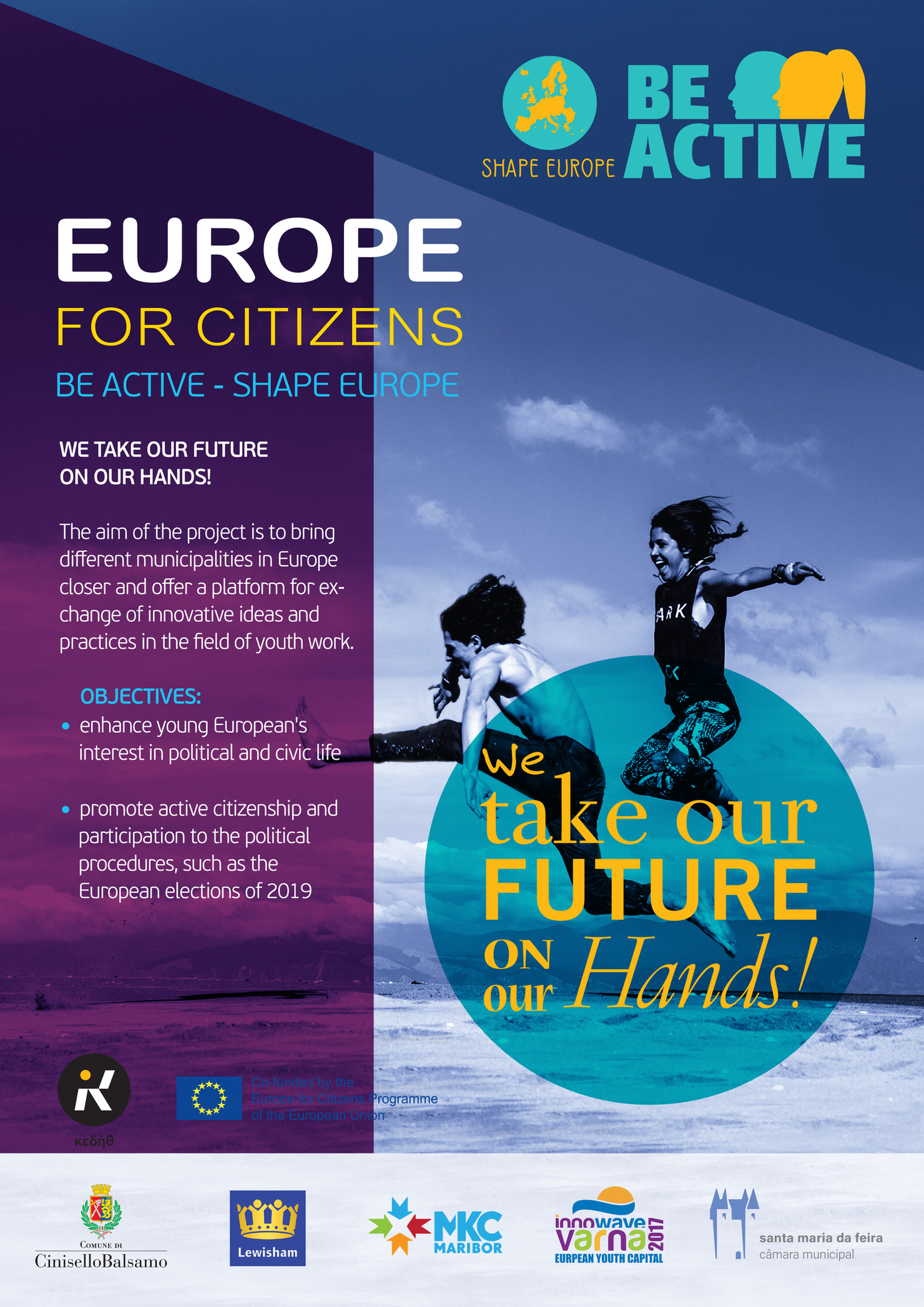
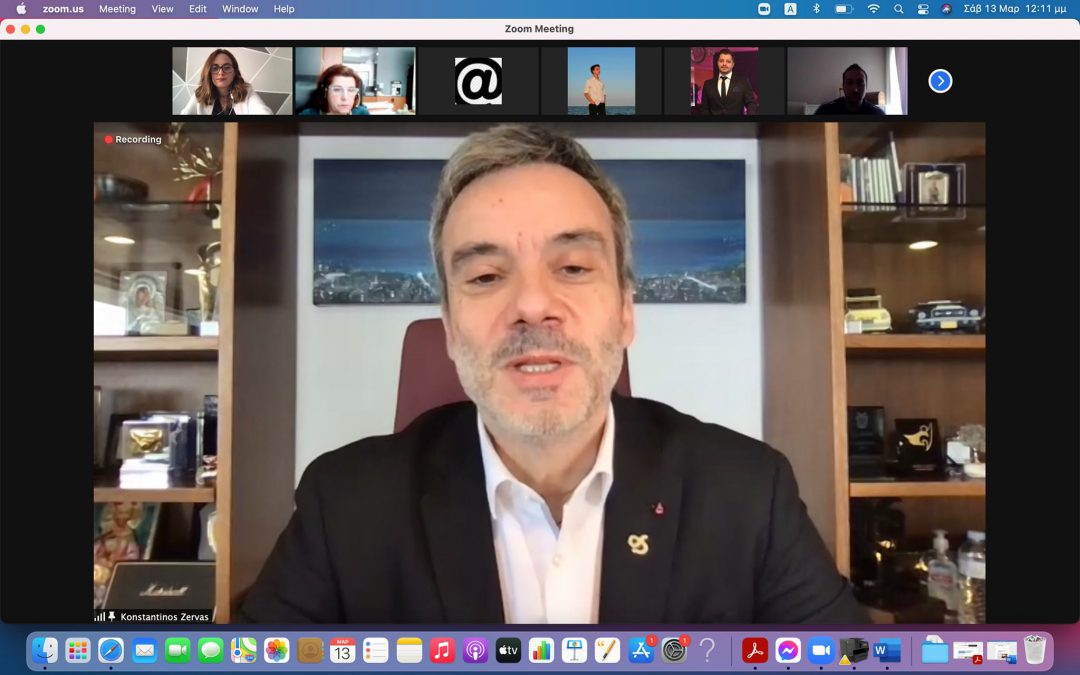
by beactive | Mar 16, 2021 | News, Press Releases
The Community Enterprise of the Municipality of Thessaloniki – KEDITH- successfully implemented during Friday 12, Saturday 13, Sunday 14 and Monday 15 March 2021 the Transnational Workshop and Transnational Simulation of the European parliament activities in the framework of the EU funded project “Be Active – Shape Europe” from the Europe of Citizens Programme of the European Union.
At the online Transnational Activities participated 50 young Europeans aged between 15 – 30 years old from the 6 participating countries of the consortium partners, namely Greece, United Kingdom, Portugal, Italy, Slovenia and Bulgaria. Besides the young Europeans, the activities also attracted the interest of youth workers, civil society representatives, local authorities representatives, municipal employees, teachers of the Secondary education, but also several EU citizens, attracted to participate as observers to the discussions of youth on “The rise of Euroscepticism in Europe VS European elections”.
During Friday 12 of March, the Transnational Workshop begun, with the Trainers team introduction to the participants, set of the context of the activities and goals of the project, while an icebreaking activity followed. After that, participants were split into different working groups according to their assignments to the Simulation of European Parliament that followed, aiming to discuss and reflect their thoughts and concerns on the subtopics of the Agenda set, on:
– The new European Parliament: priorities and challenges of the new term
– Building the future of Europe focusing on green growth and the new green deal
– The European Citizenship and what EU should do to better reach its citizens
– Challenges of the EU’ s cohesion and solidarity: migration issue and financial crisis
– The Youth’ Voice in Europe, a reality or a utopia?
– Participatory democracy in the European Union
A short reflection followed between the Trainers and participants for the first day’s activities, expected results and impact to the participants.
On the second day, Saturday 13 of March, the Simulation of the European Parliament was held, after the official opening of the Project Transnational Activities, with the welcoming speeches of the Mayor of the Municipality of Thessaloniki, Mr. Konstantinos Zervas, the Vice Mayor of the Municipality of Thessaloniki and former President of KEDITH Ms. Ioanna Kosmopoulou and the presentation of the Project to the participants by the Project Coordinator on behalf of KEDITH.
During his welcoming speech, the Mayor of the Municipality of Thessaloniki congratulated the young participants for their engagement to the project’ activities, stressed the importance of youth to be supported by the European local authorities to raise their voices and be an integral part of the decision-making procedures of their societies, so as to feel member of it and also the ownership of the decisions on a local, national and European level.
The Vice Mayor of the Municipality of Thessaloniki and former President of KEDITH from her side, welcomed as well the young participants, expressed her gratitude for their willingness and motivation to engage into the project’ activities, but also, besides others, highlighted the intensive and integral role that KEDITH plays on the strengthening of youth voice on a local, national and European level, but also the dedication of KEDITH to disseminate the results produced by the young Europeans as their voice to the local society.
During the first day of the Simulation Activity, participants were split into the 5 main political parties of the European Parliament represented in their session, analogically to the votes each received during the latest elections of the Parliament, but also to the 27 EU Member States. After the guidance of the Trainers team and a short rehearsal among the participants to understand the rules of procedure, the Plenary started the session by setting the Agenda and reflecting on the topics as proposed. Several unmoderated caucuses followed where the participants interacted as political groups to shape their common lines on each topic according to the course they had selected to discuss them. The first day of the activity closed with a short reflection of the day between the Trainers and participants.
The second day of the Simulation Activity, Sunday 14 of March, begun with the overview of the discussions by the Members of the European Parliament of the previous day, but also the intensive discussions between participants in order to form the Draft Report of the European Parliament under the topics of their discussions. Participants formed an official document, as if they were under the framework of the European Parliament, with the guidance and support of the Trainers and also, proceeded to the Amendments procedure to further modify the document, before they enter the voting procedure.
Eventually, with consensus among the Members of the European Parliament, as simulated, namely all participants voted in favor of the final Report, they approved the document reflecting their position as young Europeans to the topics of the Transnational Workshop and Transnational Simulation, on Euroscepticism, participatory democracy, youth engagement to the decision-making procedures, to the development of a greener environment for the future of Europe, the green deal, the green growth and so many other up to date topics that concern the young Europeans for the future of Europe.
During the evaluation procedure for the activity as it was implemented and the reflection activity at the end that was implemented by the Trainers, participants expressed their positive feelings from their engagement into this activity, the gratitude that they were given the leading role to shape the future of Europe as if they were the elected young Members of the European Parliament, the professionalism of the implementation but also the importance of such activities to be implemented by the European Union, as funded by the Europe for Citizens programme.
The last day of the Transnational Activities, Monday 15 March, was marked with the Transnational Workshop where the Trainers further discussed and worked with the young participants on the outcomes of the Transnational Simulation of the European Parliament and the way to adjust all their proposals into proposals under a Policy Paper that will target their local authorities, national and European decision makers as the voice of youth. At the end of this highly attractive and innovative procedure, since participants played several games using KAHOOT application to reflect on the work done all the previous days, but also the “Butterfly effect” activity of non-formal education, participants evaluated the Transnational Workshop activity, followed by a short reflection of the 4 days with the Trainers team.
The Transnational Activities were closed with the presentations offered by the partner organizations to the participants, presenting the work and produced results by each in the framework of the project, but also the next steps they plan to follow so as to further disseminate the produced results, but also to support the sustainability of the results produced for the future of their youth. Last, but not least, the KEDITH Project Coordinator and Administrative team provided important information to the participants for the next steps planned for the dissemination and sustainability of the project results, the development of the Policy Paper, reflecting the produced results, but also the distribution of the material and the Certificates of Participation of all within the following days.
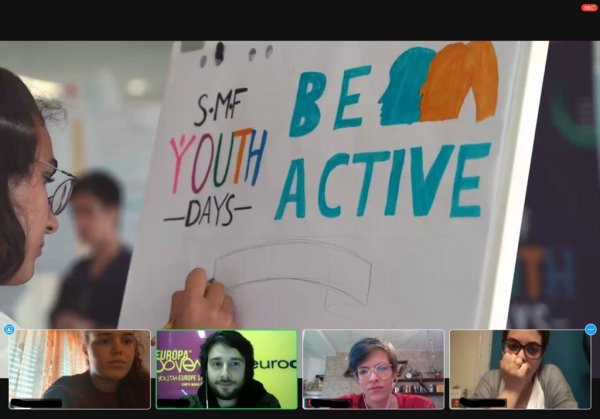
by beactive | Mar 16, 2021 | Events, News, Workshops
Il progetto BASE – Be Active Shape Europe, finanziato dalla Commissione Europea all’interno del programma “Europa Per i Cittadini” e che mira a promuovere la partecipazione dei giovani cittadini per permettere loro di contribuire alla vita politica e sociale, si è concluso con un momento di incontro e confronto online tra i partecipanti di tutti i Paesi coinvolti: Grecia, Italia, Regno Unito, Slovenia, Portogallo e Bulgaria.
Nonostante le limitazioni imposte dell’emergenza sanitaria, è stata un’ottima opportunità per vivere un’esperienza internazionale e di scambio culturale… anche se a distanza!
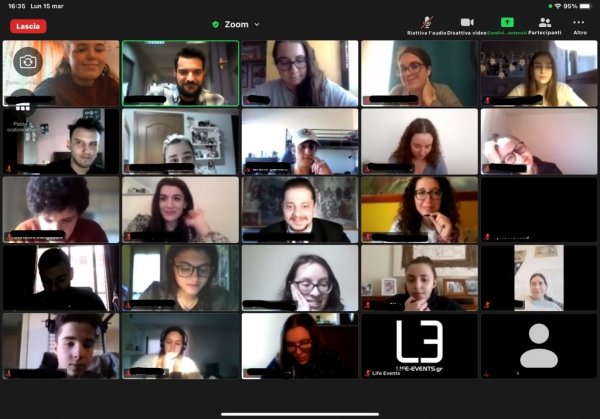
Il workshop internazionale si è svolto sottoforma di simulazione del Parlamento europeo e ha avuto luogo dal 12 al 15 marzo 2021.
Durante il primo incontro di venerdì 12 marzo, i partecipanti (tutti giovani di età compresa tra i 15 e i 30 anni) si sono presentati in modo tale da rompere il ghiaccio e conoscersi a vicenda e, successivamente, si sono divisi in gruppi. Questi ultimi simboleggiavano i diversi partiti del Parlamento europeo e ciascun ragazzo/a aveva il compito di impersonare uno dei suoi rappresentanti. I principali argomenti di discussione sono stati:
- Il nuovo Parlamento Europeo: priorità e sfide del nuovo mandato;
- Costruire il futuro dell’Europa focalizzandosi sulla crescita verde e il New Green Deal;
- La Cittadinanza Europea e cosa l’UE dovrebbe fare per raggiungere meglio i suoi cittadini;
- Sfide di coesione e solidarietà dell’UE: il problema dell’immigrazione e la crisi finanziaria;
- La voce dei giovani in Europa: una realtà o un’utopia?
- Democrazia partecipativa nell’UE
- Altri argomenti proposti dai partecipanti.
Dopo aver lavorato in piccoli gruppi, i partecipanti hanno avuto il compito di produrre un documento unico, comune a tutti i maggiori partiti del Parlamento europeo rappresentati dai gruppi stessi, che racchiudesse tutte le principali idee e proposte emerse durante i dibattiti.
Tramite l’Ufficio Eurodesk di Cinisello Balsamo, hanno preso parte al progetto 8 ragazze e ragazzi italiani che hanno partecipato attivamente, facendo sentire la loro voce e condividendo anche con altri cittadini europei le loro idee e opinioni e sono tutti rimasti molto soddisfatti dall’esperienza.
Ecco le loro testimonianze.
Tommaso (17 anni): “Inizialmente ero un po’ scettico, temevo che il fatto stesso di partecipare al progetto online lo rendesse necessariamente noioso, ma con piacere posso dire di essermi ricreduto quasi subito. L’attività mi è piaciuta moltissimo, nonostante i miei appena 17 anni sono intervenuto numerose volte e senza mai trovarmi a discutere con persone che si imponessero in virtù della loro età o percorso di studi. Ho avuto la possibilità di conoscere persone estremamente simpatiche e disponibili con cui è stato da subito facile lavorare al progetto, senza né disguidi, né incomprensioni. Inoltre, quest’attività mi ha permesso di ascoltare nuove proposte e di rielaborare le mie tornando a rifletterci con maggiore consapevolezza e in un’ottica nuova. Unica pecca forse la macchinosità di alcune formule e procedure, necessarie però ai fini della simulazione e dell’immedesimazione. Se mi venisse chiesto di partecipare alla stessa iniziativa una seconda volta o ad altre non esiterei affatto a rispondere, veramente tempo più che ben speso.”
Giulia (17): “Era la prima attività di questo tipo alla quale ho avuto l’opportunità di partecipare. Inizialmente ero spaventata dalla differenza di età tra me e gli altri partecipanti, alcuni dei quali erano anche laureati, ma alla fine non è stata determinante. Quest’iniziativa mi ha dato la chance di informarmi maggiormente su tematiche spesso ricorrenti e di attualità, potendo integrare quello che già sapevo con ciò che hanno detto i miei “colleghi parlamentari”. Era tutto ben organizzato e lo staff è stato molto disponibile ad aiutare chiunque avesse problemi tecnici. Farsi coinvolgere in questi progetti è sempre la scelta giusta.”
Sofia (18 anni): “L’esperienza svolta per il progetto BASE è stata stimolante e coinvolgente. Strutturata come una lunga simulazione del parlamento europeo, l’obiettivo dell’attività era quello di produrre un documento, comune a tutti i maggiori partiti del parlamento, che riportasse indicazioni e obiettivi per costruire l’Europa che tutti vorremmo. Il prodotto finale è stato un file che conteneva aspirazioni, progetti per il futuro dell’UE, e idee per una realtà diversa e migliore. Mi sono trovata davvero bene con tutti gli altri partecipanti, propositivi e con tanta voglia di condividere aneddoti ed impressioni sul loro paese d’origine (oltre a noi italiani c’erano, per la maggior parte, ragazzi e ragazze greci e portoghesi) ed è stato davvero interessante vedere quanto, nonostante le differenze, abbiamo gli stessi obiettivi. Sono molto contenta di aver partecipato e sono certa che questa attività mi abbia arricchito sia a livello conoscitivo (sperimentando sul campo il funzionamento del parlamento europeo e le sue dinamiche) sia a livello umano (dandomi l’opportunità di confrontarmi con persone con le quali altrimenti non avrei mai avuto occasione di parlare).”
Alessia (22 anni): “Il progetto BASE è stato interessante mi ha permesso di capire meglio come funziona la legislazione europea. Siamo stati divisi nei partiti di maggioranza del parlamento europeo, con l’obbiettivo di creare un documento comune per costruire l’Europa che vorremmo. La simulazione svolta mi ha permesso di capire nel dettaglio come vengono prese le decisioni. Mi sono trovata molto bene con gli altri partecipanti, tutti con molta voglia di impegnarsi e conoscere meglio come funziona la nostra Europa. Anche gli organizzatori sono stati molto disponibili e gentili. Sono molta contenta di aver partecipato.”
Laura (20 anni): “Grazie a questo progetto ho avuto l’opportunità di partecipare ad un brain storming tra giovani europei con tante idee per il futuro. Be Active Shape Europe è nato con l’intento di simulare il Parlamento europeo in una seduta di confronto tra diversi partiti, per raccogliere idee, soluzioni e progetti riguardanti diversi temi e fenomeni come il cambiamento climatico, la cittadinanza europea, la crisi migratoria, la democrazia… Ma soprattutto la voce dei giovani. Questo incontro di culture e realtà apparentemente estranee mi ha fatto sentire realmente parte della comunità europea: ragazzi greci, portoghesi e italiani che hanno le stesse speranze e gli stessi obiettivi malgrado le distanze e le difficoltà del nostro presente.”
Maria (24 anni): “Con grande interesse ed entusiasmo, ho deciso di prendere parte a “Be Active Shape Europe!”. Nello specifico, il progetto aveva come finalità ultima, il coinvolgimento di giovani europei e la promozione di una cittadinanza europea consapevole. Quest’esperienza si è rivelata per me estremamente costruttiva poiché mi ha permesso di comprendere più nel dettaglio le dinamiche relative ai processi di policy making nel parlamento europeo, di entrare in contatto con un gran numero di giovani provenienti da diverse zone d’Europa e di fare sentire la mia voce in quanto cittadina europea! Abbiamo discusso e approfondito tematiche cruciali nella nostra epoca, quali l’impegno civico e lo sviluppo sostenibile, e ritengo sia stato un ottimo modo di imparare divertendosi!”


by beactive | Mar 15, 2021 | News
The “Be Active- Shape Europe” project is developed by 6 European Municipalities recognizing the importance to jointly address the youth engagement and active European citizenship.
The project is funded by Europe for Citizens Programme of the EU.
>>Read for more

